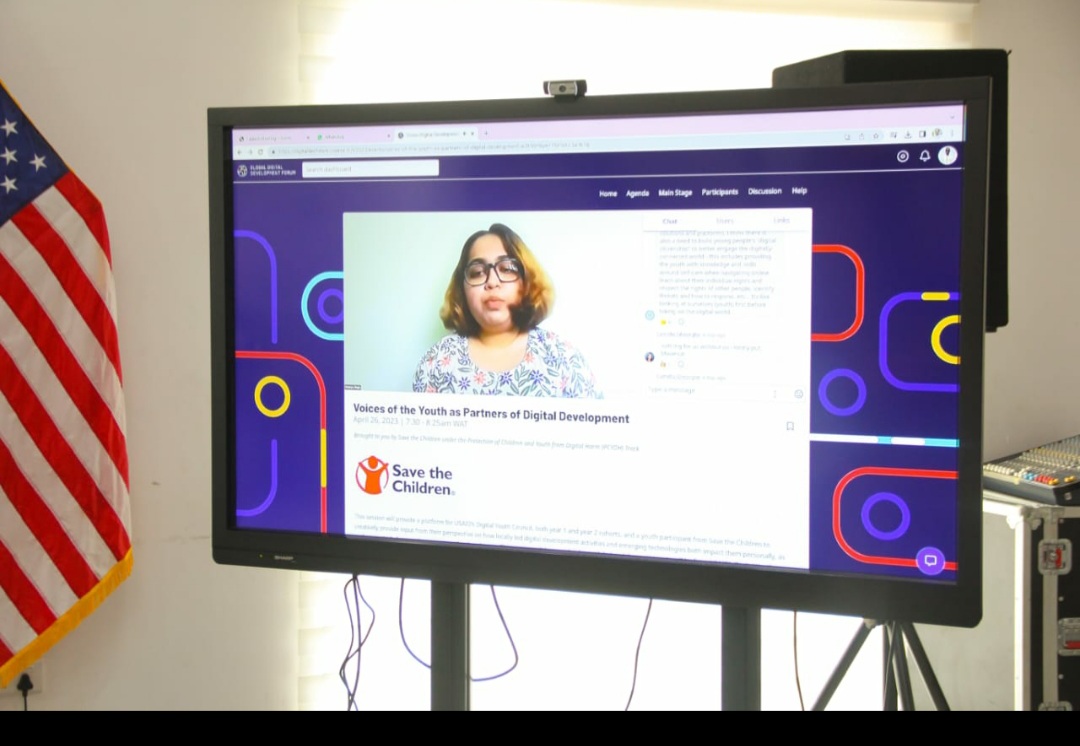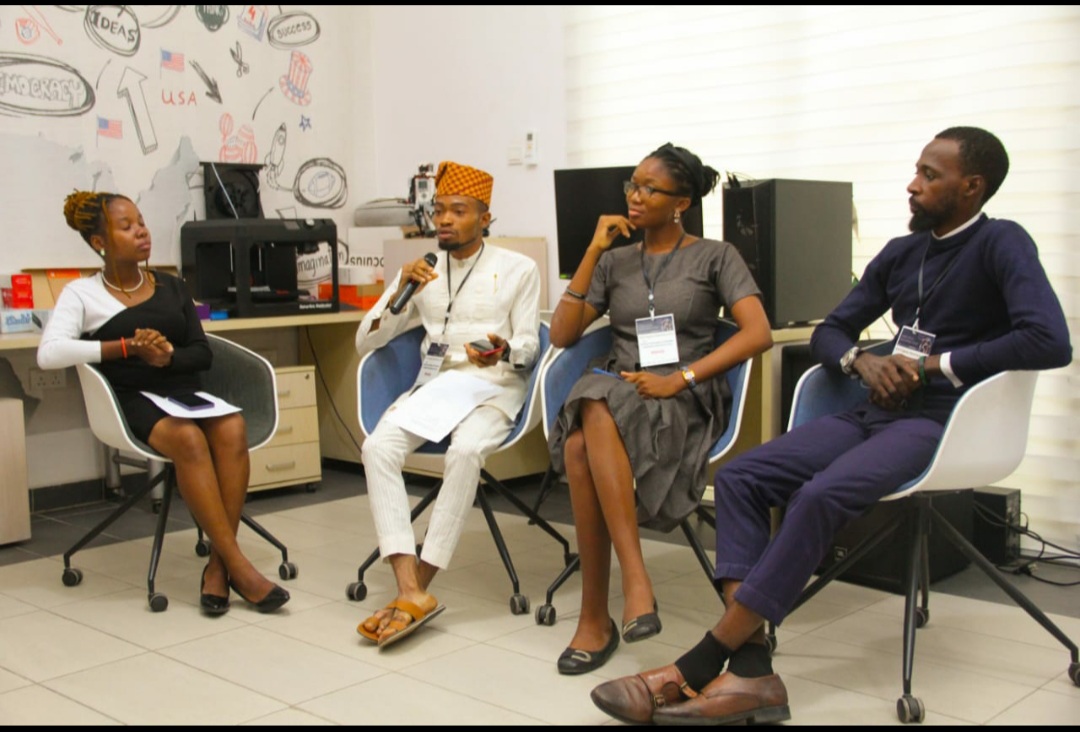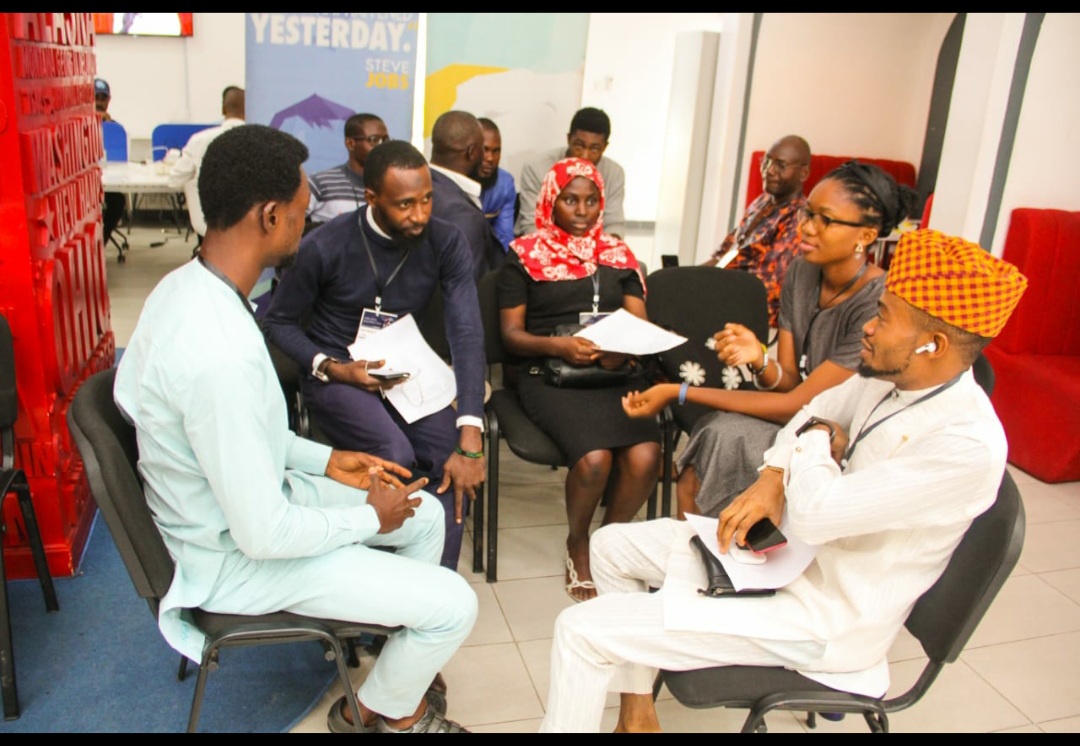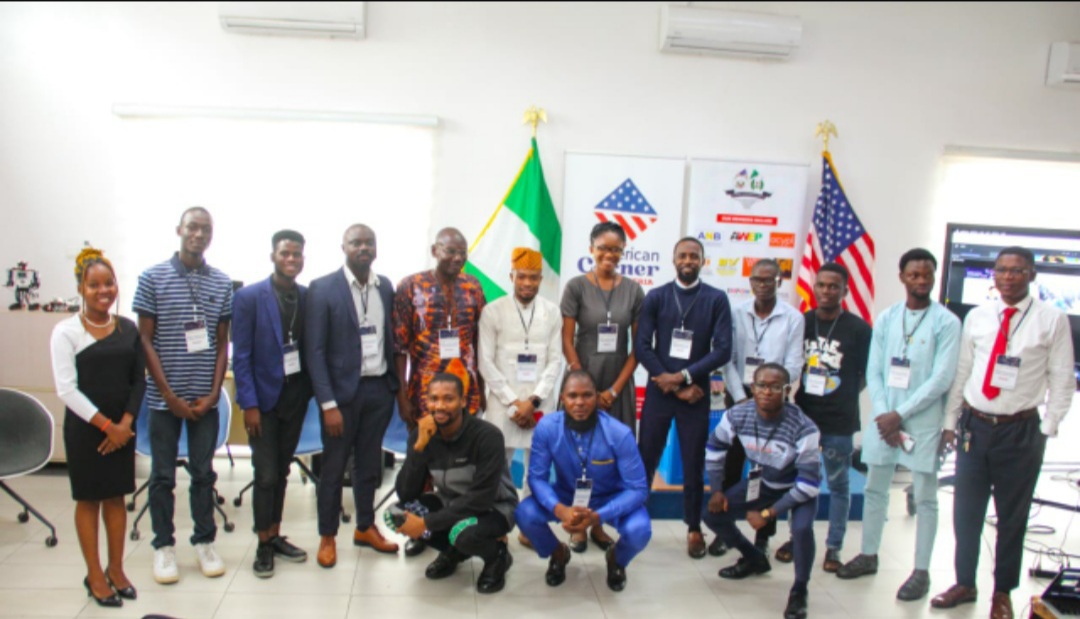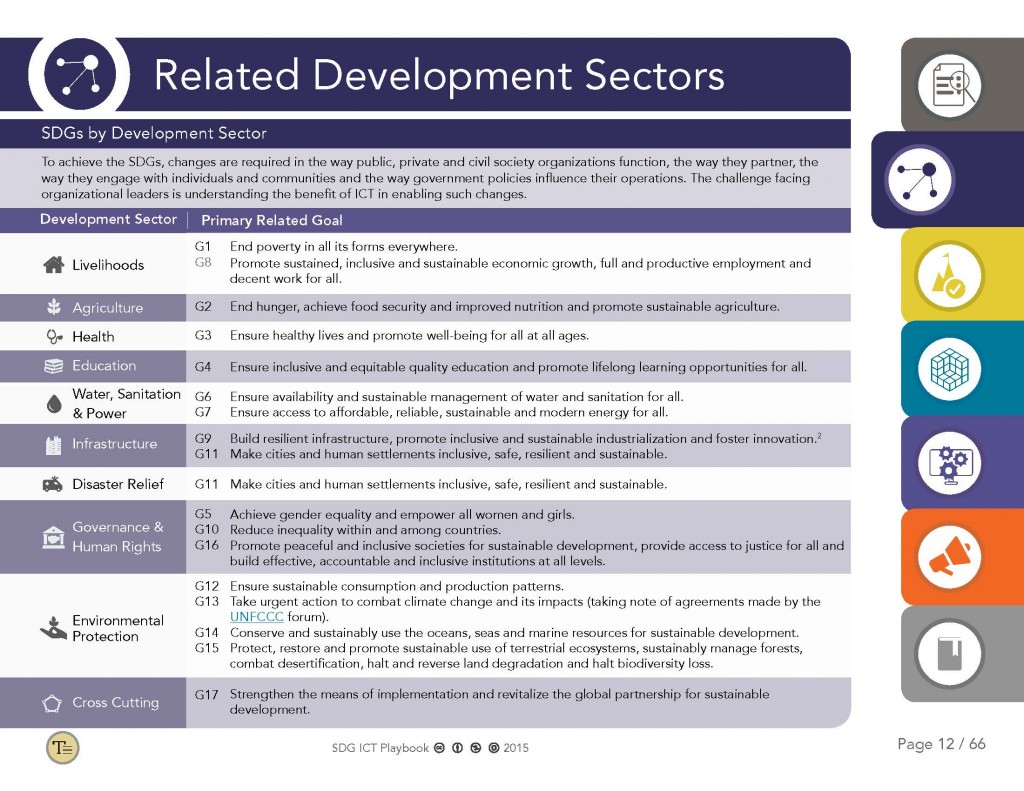By: Lilian Efobi, GDDF Ambassador, Nigeria
As a young leader passionate about quality education and good governance, which are centred on the SDGs 4 and 16 of the United Nations, organising the first ever Global Digital Development Forum (GDDF) 2023 Nigeria Watch Party was a great opportunity for me to create more awareness on the sustainable development goals and how emerging technologies can play a key role in fostering sustainable development.
On April 27, 2023, the Global Digital Development Forum was held in over 7 countries globally through in-persons watch parties, with the main event happening at Washington DC, USA. The event brought together some of the biggest names in the tech and development industry, including Google, Deloitte, DAI, RTI and more, as well as development experts and government officials. Through GDDF 2023, TechChange has played the lead on global hybrid events by showcasing the following benefits:
1. Increased reach: GDDF 2023 was able to reach over a four thousand person audience across several countries. The participants had access to the numerous educative sessions, lightning talks, and more that happened at the forum. Participants from my watch party were not left out from enjoying the benefits of a hybrid event.
2. Increased engagement: This year’s GDDF saw an increased engagement amongst attendees of my watch party in Nigeria.
3. Sustainability: TechChange hybrid event is not just an improvement on the setback by the Covid-19 pandemic, but also a sustainable way in reducing carbon footprint and safeguarding the environment and climate, by giving participants all over the world the platform to attend the forum virtually, without harming the earth through travel and other resources. Hybrid events can help reduce the carbon footprint of an event by reducing the need for travel and other resources.
One of the major discussions at the watch party was the panel session on: “Emerging Technologies for Sustainable Development: Attaining SDGs 2030.” During this session, the panel discussed on how emerging technologies can help address some of the world’s most pressing challenges, from climate change to poverty and inequality. Social innovations can target the following emerging technologies in addressing some of the challenges of the SDGs:
1. Renewable energy technologies, such as solar, wind, and hydroelectric power can help reduce greenhouse gas emissions and combat climate change, which is a key goal of SDG 13.
2. Artificial Intelligence (AI) and machine learning can be used to improve healthcare outcomes, enhance agricultural productivity, and optimize transportation networks, all of which are critical to achieving SDG 3, SDG 2, and SDG 11, respectively.
3. Blockchain technology can be used to create transparent and secure supply chains, which can help reduce corruption and promote sustainable consumption and production practices, which are key goals of SDG 12.
4. Internet of Things (IoT) devices can be used to monitor and manage natural resources, such as water and energy, which can help ensure their sustainable use and management, a key goal of SDG 6.
5. Virtual and augmented reality technologies can be used to promote education and awareness about the SDGs, which can help mobilize global action towards achieving them.
These technologies can play a critical role in achieving the SDGs by enabling us to work smarter, more efficiently, and more sustainably. However, it is important to ensure that these technologies are deployed in a responsible and ethical manner to avoid unintended consequences and negative impacts. They also highlighted the need for Africa to build a databank, which will help in research.
Another major highlight of the Watch party was the Hackathon. This was made possible due to the flexibility given by TechChange in spurring creativity and unique watch parties globally. The watch party was an avenue to showcase amazing technology solutions addressing social problems and encourage these solutions through mini-seed funding. Most of the ideas were aimed at providing eco-friendly solutions, encouraging climate action, promoting agriculture, and creating environmental sustainability.
Some of these ideas are:
AYIKA
A climate WhatsApp chatbot called Ayika which gives people access to their environment and gives people advice on how they can provide eco-solution daily and send environmental reports they have. With this platform, people will be able to use AI and VR together to predict weather in the location where they are, participate in environmental e-commerce platform where they can buy eco-friendly products. It also helps them in encouraging behaviour in recycling, reducing carbon footprint, and keeping environment safe. Ayika is focusing on youths providing entertainment including music, comedy, and games that centre around the environment. They are looking at raising 5000 US dollars that could create an AI to help do this because there is limit to what they can do with WhatsApp.
Dry Card innovation focuses on the agriculture sector especially post-harvest losses, food waste, food storage and safety. They want to see how to prevent food wastage whereby food can be stored for a longer period, and it can even be stored for exports. The Dry Card is an indicator that shows when food is dried and can immediately be stored in airtight containers which will make it last longer. They want to launch it across the 36 states in Nigeria. USAID, UC Davis labs are giving them technical support and are subsidizing the card for them. This is why the card can go for as low as 2 US dollars.
With a biodigester, the remains of food, waste from poultry, and vegetables are digested under anaerobic conditions to convert them to gas to be used for cooking. It is non-flammable and cost-effective. The waste gotten from the biodigester can be used for crop improvement as it is an organic fertilizer.
Lumilab helps customers thrive on change through a clear and confident vision for navigating the future and have met the challenges of innovation many times. Lumilab’s corporate vision is to become the major player and be recognized for technological innovation and solutions and build capacity for skills and collaboration.
Conalle is the biggest search engine on the African content. It is a Digital Marketplace that provides Nigerian and other African creatives a digital platform to license high-quality African centred contents, such as photographs, videos, mock-ups, illustrations, presents, 3D Images and audios, to other creatives, business owners, marketing, advertising agencies, and individuals across Africa and beyond, and these contents can be used for the various design, advertising, and marketing purpose in the real, virtual, augmented, and mixed reality world. Conalle is providing African creative a platform to connect globally. Also, Conalle aims to empower, support, and contribute to the growth and development of the creative industry in Africa, and beyond by prioritizing the needs and interests of the African creatives. It is also a visual discovery engine that offers African creatives the latitude to showcase their art and at the same time, it is also making provision for the publicity of afro centric content.
Wasty Wealth is making the planet clean, safe and circular through a just-in-time, asset-light, and professional waste collection system. Our solution also bridges the gap between waste producers and waste management players through our digital marketplace.
WINDSTREAM
Windstream is a solution that positively impacts the environment and local communities. By providing access to clean, affordable energy, they help to reduce energy costs, improve air quality, and promote a more sustainable future. They also hope to help create about 4000 local jobs and promote sustainable economic growth.
In all, GDDF 2023 Nigeria Watch Party was a huge success as reflected in some of the feedbacks from participants:
“GDDF 2023 is to bridge the gap between emerging technologies and SDGs. We want to make sure that emerging technologies will play a role in the goals set for 2030. There were 7 major contents – sustainability, originality, business model, technology used, creativity involved, design and implementation, and social impact”.
“Youth being part of the digital system is very important because we will be here for a very long time, and we will also pass it on to our children. We need the support of government. It can’t be done by NGO alone. We need the understanding of the government”.
“We need more female innovators to come out with their ideas. All the 7 today were males. We must make conscious effort to push our ladies. SDG 5 talks about gender equality. We want marginalized communities to participate, we want women, young ones, and older persons to participate.”
“Global Digital Development Forum 2023 is happening in 7 other countries across Africa. It is a hybrid event. Young Nigerians are leveraging emerging technologies to create solutions to address climate change. I have seen passion and dedication towards what people do. They have also known that it is a different thing to have the digital solution and another to have the digital skills. They have been told where they can learn more about these resources to bridge the digital skill gap”.
“I am so glad to be part of this programme. I was able to learn and network and meet others. I have gotten insights and clearer view about how to use AI to mitigate climate action. AI is now taking the position of humans. I am also thinking of bringing my project soon for sustainable change. I like the fact that you can now use chat box to mitigate climate change. It is participatory, it is interactive, and it is usable both in the rural and global”. As an Ambassador for GDDF 2023, it was not just a platform to discuss on climate change, development, and emerging technologies; it was a Call-to-Action period for me and all credit to TechChange and her amazing partners for the support, innovation, and platform in creating awareness on Global Digital Development and supporting innovations in that line.

